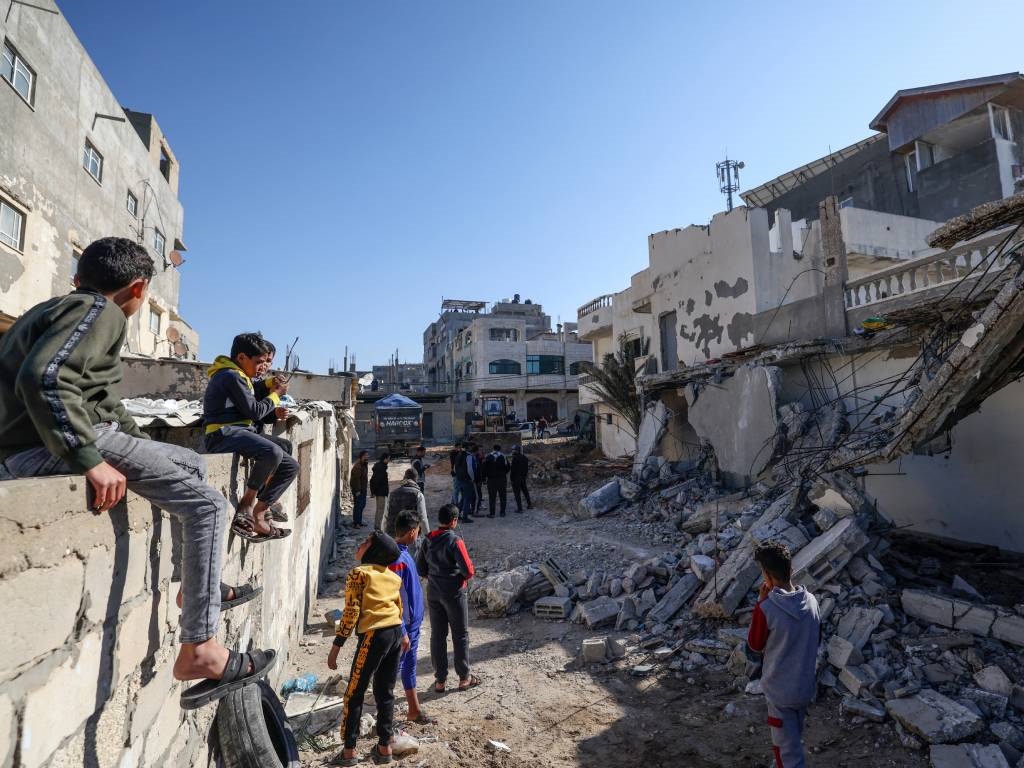
If we are going to avoid another Nakba the time to act is now, argues Oscar van Heerden. We owe it to both the Jewish and Palestinian people in that part of the world, he writes.
You may recall that last week, I shared my observations about my recent visit to Palestine and Israel and, in my depiction of "The tale of two cities," I contrast Jerusalem and Ramallah.
Well, today, in this second addition, I offer my political analysis of what I observed there. The first thing to state, in my opinion, is that for some, the Palestinians are the new Jews.
The Jewish population all around the world since time immemorial, and more recently in the 1920–1950s, will recall how Jews were shunned by almost all in Europe and elsewhere in the world. They were forced into ghettos in most cities. They were seen as scum and as participating in underhand activities and active in the underworld of finances.
Prejudices were always directed at Jews, and many argue the real reason why Arthur Balfour and others in Europe were so keen to agree with the Zionists for a land for Jews, was precisely because these individuals and peoples were antisemitic, in fact. Western countries could not wait to expel the resident Jews and allow them to immigrate to their newfound home, Israel, in order to rid themselves of the Jewish problem.
This is the history of the Jews, and we all know what happened because of this hatred of the Jewish people. Adolf Hitler and his Nazi party were able to perform the most horrific genocide of a peace loving and humane people. Jews and others suffered the most horrific ethnic cleansing the world has ever seen. Millions of Jews were exterminated in one fell swoop. The Holocaust will reverberate in our minds for decades to come. We must never forget. And yet, you will all agree, it is the Palestinians that are now seen as the scum of the earth.
Wherever they may go, they are seen as terrorists. Arab states and Israel shun them to the modern-day ghettos in the form of refugee camps all over the region. There is also the open-air prison, which is Gaza. Palestinians are treated as subhuman by everyone. Does this not sound familiar? Palestinians are indeed the new Jews.
Disunity
In addition to this, there exists so much disunity all round on both the Israeli and the Palestinians side. Allow me to explain what I will refer to as 'splinter groups' whereas in the territories, it is referred to as factions.
On the Palestinians' side we have the various political partie - Fatah, Hamas, The Popular Front for the Liberation of Palestine (PFLP), and the Democratic Front for the Palestine (DFLP). On the Israeli side, political parties are Likud, Yesh Atid, Shas, Religious Zionism, United Torah Judaism, Otzma Yehudit, Yisrael Beiteinu, United Arab List, Hadash-T’al, Labor Party and Noam, to mention some.
The point of outlining all these parties on both sides of the divide is because though they may differ with each other on ideology and policy matters, all on the Palestinian side and all on the Israeli side agree on one matter, and that is the destruction and annihilation of the other side.
Let me make this point clearer, the Palestinians don’t want the occupier in their land, and the Israelis don’t want the Palestinians in their land.
Furthermore, we have the Jerusalemites. These are people living in East Jerusalem and are not considered Palestinians nor Israeli. For the longest time, they were under the administrative control of Jordan. In other words, they are stateless.
They are given an Israeli identity card for the purposes of being allowed to travel in and out of Israel in order to be able to access their homes, and Jordan gives them a travel document, not a passport, to enable them to travel internationally at least. Neither states claim them as their own citizens though.
And just when you think you now have a handle on the splinter groups, you are then introduced to the "48 Arabs" inside the territorial boundaries of Israel.
The complexities of finding a solution
These are Arab citizens of Israel, and they are the largest ethnic minority in the country. They comprise a hybrid community of Israeli citizens with a heritage of Palestinian citizenship, mixed religions of Muslim, Christian or Druze. They are generally bilingual in Arabic and Hebrew. How they came about is, after the Nakba of 1948, they are the Palestinians that remained within Israel's 1948 borders and hence colloquially became known as "48 Arabs".
I inform you of all these groups in order to demonstrate the complexities of finding lasting solutions and why it has been so difficult over many decades to find solutions for the ongoing "colonialism of a special type", where the occupier and the occupied live side by side inside the same territorial borders.
READ | Mpumelelo Mkhabela: Lessons from Israel - Can we defend our judges against power-hungry politicians?
I observed first-hand the divisions prevalent among the Israeli population because of the draconian laws Benjamin Netanyahu’s coalition government wants to force through the Knesset, which will severely curb the powers of the independent judiciary.
In effect, the new laws will empower Israel's parliament to sidestep certain court findings, including the highest court in the land. The far-right government is attempting to violate the constitution of Israel and create an authoritarian state. It might be argued, as the government does, that this is not going to lead to an abuse of power, but we all know that it's only a matter of time for a far rightwing government to exploit that very assurance.
Talks fell flat
Suffice to say, Israelis do not see eye to eye on this matter. Equally, the recent attempt by the Egyptian government to facilitate unity talks among the Palestinians fell flat. They could not even agree on a final communique after the talks, which is the clearest indication of the extent of the disunity among them. President Mahmoud Abbas arrived there and placed unreasonable non-negotiables on the table, and the rest is history, as they say.
Ongoing tension in Gaza is another contributing factor in the bigger scheme of things. By the way, the Israeli government does not allow anyone to visit Gaza these days. They simply refuse anyone access into Gaza. Not sure why, but they have cut off the Palestinians in that part of the occupied territories.
READ | OPINION: For decades, I defended Israel from claims of apartheid. I no longer can
Another matter which looms large in Israel is the fact that more than 1 100 Israeli Air Force reservists, including more than 400 pilots, issued a letter announcing that they will suspend their volunteer reserve duty in protest over the government's plans to overhaul the judicial system. This is a massive blow for the Netanyahu government because this kind of dissent in the IDF is historic and very telling about the direction Israel is taking in this ongoing war with the Palestinians.
Now, let me be bold and make a prediction here. Soon, within the next few days or weeks, we will see a confrontation with Lebanon. Why, you might ask? Well, with a low-intensity war, Netanyahu will kill two birds with one stone.
On the one hand, he will take attention away from the ongoing violent protest taking place daily now in the streets of Tel Aviv and, on the other hand, you compel the pilots to return to active duty because there's now a war situation and it forces the pilots back to defend the Holy State of Israel.
Finally, I dare add to this mix that the religious context of this whole conflict and the fact why fundamentalism is so pervasive as to why we are finding it difficult to solve this problem. I admit that my opinion on these matters will not find resonance necessarily with either group, but nonetheless, I have the following options to put on the table:
- A one-state solution where different administrative territories exist. It would mean the end of the Jewish state as we know it, and I’m under no illusion that this will be fought against;
- Continue fighting fire with fire; in other words continue with the ongoing conflict. The end result is the total annihilation of one or both sides;
- The total extermination of the Palestinians from the whole of Palestine. In other words, the ethnic cleansing project continues;
- A comprehensive intervention by the rest of the world to find a lasting, functional and decisive solution to this ongoing and intractable conflict. Foreign direct investment and rebuilding of viable infrastructure such as harbours, airports, roads etc;
- Give equal citizenship to all and allow the return of all Palestinian exiles and refugees.
These are difficult choices and need quality leaders to step up and ensure reconciliation and the transformation of the new state. We need leaders such as Yasser Arafat and Yitzhak Rabin, both of whom received the Nobel Peace Price in 1994 for their visionary leadership. It can be done.
So, if the Palestinians are the new Jews, and we all know how it ended for the Jewish people in Europe, do we only want to act when we yet again observe to our horror another mass extermination, another Nakba, but this time with much more devastating consequences?
Surely, the time to act and act decisively is now. We owe it to both the Jewish and Palestinian people in that part of the world.
- Dr Oscar van Heerden is a senior research fellow for African Diplomacy and Leadership at the University of Johannesburg.
*Want to respond to the columnist? Send your letter or article to opinions@news24.com with your name and town or province. You are welcome to also send a profile picture. We encourage a diversity of voices and views in our readers' submissions and reserve the right not to publish any and all submissions received.
Disclaimer: News24 encourages freedom of speech and the expression of diverse views. The views of columnists published on News24 are therefore their own and do not necessarily represent the views of News24.




 Publications
Publications
 Partners
Partners























